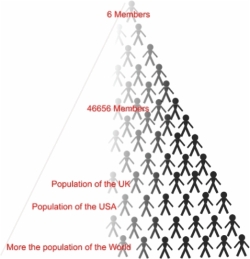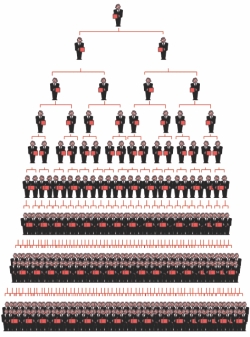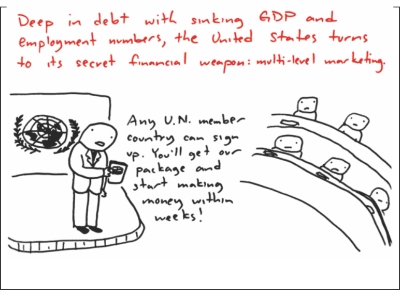| Home - Back Issues - The Team - Contact Us |
 |
| Volume 11 |Issue| 15 | April 13, 2012 | |
|
|
Economy Behind Multilevel Marketing In the wake of newspaper reports that Destiny Multipurpose Cooperative Society is allegedly swindling away huge amounts of money from the public, the Star explains the process of multi-level marketing Naimul Karim
The recent disclosure of assets of Destiny Multipurpose Cooperative Society, a sister organisation of Destiny 2000, a multi-level marketing (MLM) firm, has once again brought MLM-based companies under scrutiny. Newspaper reports published state that the company had increased its assets from Tk 5.53 crore in the fiscal year of 2008-09 to Tk 1,200 crore in 2010-11. The Bangladesh Bank in its report claims that the company has been running illegal banking activities, following which Destiny 2000 challenged the Central Bank's report. The MLM-based company also sued four dailies on grounds of defamation. While the upcoming week hopes to make matters regarding the company's growth a lot more clear to the public, one needs to understand as to why MLM-based companies frequently come under the scanner. Multilevel Marketing is a form of direct sales where dealers can earn money not only from the products they sell but also from the sales of the distributors they recruit. A person can become a distributor by buying a certain amount of services or products from the seller. People often tend to become distributors in order to buy their own products at a lesser price. Once they become distributors they can buy products at a 'wholesale' value, sell them at a 'retail' price and recruit other distributors who can do the same. The recruiter is then eligible to collect a percentage from the distributors under him. While companies may describe this process as a money-making opportunity, reports based on the performance of several international MLM firms suggest that people are bound to face losses, unless a person joins the company during the initial months of the operation or becomes an 'early' distributor. Initially the concept MLM was designed to take the manufacturers' products into the market, however, the focus gradually changed to hiring more distributors. It was an attempt to increase sales– the more the number of sellers, the higher the profits. The change in focus led to exponential growths in sales charts and encouraged companies to begin MLM divisions. However, the process also leads to an increase in supply of products which eventually decreases the demand. Thus, a large section of distributors are in danger of being left with products they can't sell.
A report published by a former member of Amway, a famous multilevel marketing company based in Michigan, says that 98 per cent of its distributors or participants don't make profits once they are enrolled in the schemes. One of the reasons is recruits being encouraged to further hire people, which eventually lead to market saturation. While several countries have curbed MLM-based companies through different laws, Bangladesh however, lacks a proper system to protect people from possible scams. "The problem is that our system doesn't have laws that are strong enough to prevent MLM from flourishing. These are the grey areas of our system which require a lot more focus," says Akbar Ali Khan, former advisor to the caretaker government, when asked about the presence of multi-level marketing in the country. "The kind of offers presented by MLM-based companies is not realistic," he adds. The so called 'grey areas' make it a lot more difficult to convict people in MLM related scams. For conviction, one needs to establish that the business promoted by multi-level marketing is illegal, which is difficult in the absence of any specific law that relates to MLM. What makes matters worse is that most of the reports against MLM are by secondary customers who have bought products from none other than existing customers, one level above them, a process that results in further complexities. As witnessed before, during the Jubok-scam, the MLM firm targeted the youth and residents from rural areas by exploiting their need for a better lifestyle.
Echoing Khan's sentiments, Dr. Mustafa K Mujeri, former Chief Economist, Bangladesh Bank says," Multilevel Marketing is a wide concept and requires a good legal structure to avoid it from being misused; it's not illegal as such. But in order to prevent people from losing their money to possible scams, the government needs to set up a proper structure." Critics of the strategy claim that MLM has outlived its tenure of being a successful marketing strategy. The increasing paths, by which manufacturers can directly sell their products to consumers, have made the model, a 'thing of the past'. Exploitation of relatives for recruiting targets and new sales, exaggerated schemes and the use of corrupt techniques to get more members are some of its other criticisms. Whether the allegations raised against Destiny are upheld by the court or not, the upcoming week promises a fierce battle. With members of the company claiming that they have nothing to hide and challenging the BB's report, only time can tell whether the company that grew rapidly in the last three years will continue to exist. With the company having expanded in various sectors and involving more than 70 lakh members, the next few weeks will witness a lot of people praying and hoping that they didn't place their money in the wrong hands.
Copyright
(R) thedailystar.net 2012 |



